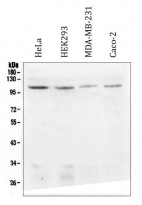ARG43048
anti-DIS3 antibody
anti-DIS3 antibody for Western blot and Human
Overview
| Product Description | Rabbit Polyclonal antibody recognizes DIS3 |
|---|---|
| Tested Reactivity | Hu |
| Tested Application | WB |
| Host | Rabbit |
| Clonality | Polyclonal |
| Isotype | IgG |
| Target Name | DIS3 |
| Antigen Species | Human |
| Immunogen | Recombinant protein corresponding to Q62-A304 of Human DIS3. |
| Conjugation | Un-conjugated |
| Alternate Names | dis3p; EXOSC11; KIAA1008; 2810028N01Rik; Ribosomal RNA-processing protein 44; RRP44; EC 3.1.26.-; Exosome complex exonuclease RRP44; EC 3.1.13.-; Protein DIS3 homolog |
Application Instructions
| Application Suggestion |
|
||||
|---|---|---|---|---|---|
| Application Note | * The dilutions indicate recommended starting dilutions and the optimal dilutions or concentrations should be determined by the scientist. |
Properties
| Form | Liquid |
|---|---|
| Purification | Affinity purification with immunogen. |
| Buffer | 0.2% Na2HPO4, 0.9% NaCl, 0.05% Sodium azide and 4% Trehalose. |
| Preservative | 0.05% Sodium azide |
| Stabilizer | 4% Trehalose |
| Concentration | 0.5 mg/ml |
| Storage Instruction | For continuous use, store undiluted antibody at 2-8°C for up to a week. For long-term storage, aliquot and store at -20°C or below. Storage in frost free freezers is not recommended. Avoid repeated freeze/thaw cycles. Suggest spin the vial prior to opening. The antibody solution should be gently mixed before use. |
| Note | For laboratory research only, not for drug, diagnostic or other use. |
Bioinformation
| Database Links | |
|---|---|
| Gene Symbol | DIS3 |
| Gene Full Name | DIS3 homolog, exosome endoribonuclease and 3'-5' exoribonuclease |
| Function | Putative catalytic component of the RNA exosome complex which has 3'->5' exoribonuclease activity and participates in a multitude of cellular RNA processing and degradation events. In the nucleus, the RNA exosome complex is involved in proper maturation of stable RNA species such as rRNA, snRNA and snoRNA, in the elimination of RNA processing by-products and non-coding 'pervasive' transcripts, such as antisense RNA species and promoter-upstream transcripts (PROMPTs), and of mRNAs with processing defects, thereby limiting or excluding their export to the cytoplasm. The RNA exosome may be involved in Ig class switch recombination (CSR) and/or Ig variable region somatic hypermutation (SHM) by targeting AICDA deamination activity to transcribed dsDNA substrates. In the cytoplasm, the RNA exosome complex is involved in general mRNA turnover and specifically degrades inherently unstable mRNAs containing AU-rich elements (AREs) within their 3' untranslated regions, and in RNA surveillance pathways, preventing translation of aberrant mRNAs. It seems to be involved in degradation of histone mRNA. DIS3 has both 3'-5' exonuclease and endonuclease activities. [UniProt] |
| Cellular Localization | Cytoplasm. Nucleus, nucleolus. Nucleus, nucleoplasm. Nucleus. Note=Predominantly located in the nucleus (PubMed:20531386). According to PubMed:12429849, found in the nucleolus (PubMed:12429849). According to PubMed:20531386, excluded from nucleolus supporting the existence of a nucleolar RNA exosome complex devoid of DIS3 (PubMed:20531386). [UniProt] |
| Calculated MW | 109 kDa |
Images (1) Click the Picture to Zoom In






